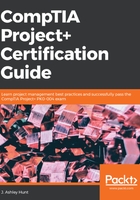
Project management knowledge areas
There are 10 areas of expertise or knowledge that can be utilized on most, if not all, projects. The 10 project-management knowledge areas each contain specific processes, input, tools and techniques, and output that relate to specific areas of the project. These knowledge areas come from the Project Management Body of Knowledge or the PMBOK? Guide – 6th edition.
You will cover a variety of best practices and processes from their related knowledge areas as you move through this guide. This is just an overview of each knowledge area and its role in project management. As you go through the overview, ask yourself which of these knowledge areas are part of your day-to-day projects that would need to be planned for, executed, monitored, and controlled.
Some project managers only work with the core constraints of scope, time, and cost, on a regular basis and may not be involved in procurement activities for example, and each project manager determines what is necessary to utilize in their unique projects. In one project, you may need a comprehensive quality-management plan and in others you may not. It is part of the project manager's responsibility to understand the knowledge areas, best practices, and the processes well enough to determine what is needed and what is not:
- Project-integration management: It involves determining what is necessary to create a comprehensive project-management plan to properly manage the project. This is also where the project charter and deliverables are created, where project work is monitored and controlled, and where formal project or phase closure occurs.
- Project-scope management: It coordinates the collection of requirements for both product and project scope of work, plans how that work will be completed, and includes formal signoff on the deliverable by the customer. The scope of work is a key constraint that could very well be the main influencing factor on your schedules, budgets, and resource assignments.
- Project time/schedule management: It is the knowledge area that deals with scheduling. It's important to correctly determine activities or tasks and sequence them in a logical fashion. Once we know the order in which things occur, we can then begin to estimate resources and durations to come up with a schedule that we can probably meet.
- Project-cost management: It deals with estimating costs, budgeting costs, and controlling costs. Not all project managers manage budgets, but somebody is paying attention to the money based on the business case. It's important to understand the best practices in case you are asked to manage a budget for people, equipment, or materials at some point in your career.
- Project-quality management: It deals with best practices to produce a deliverable or result that is fit for use and that works the way it's designed to work. Part of quality management involves planning for how to meet requirements and to document your quality process, as well as making sure that you're managing quality during project-execution and controlling quality to prevent defects. This may be another knowledge area that is not a part of your day-to-day work, but everybody is concerned with the quality of the results and therefore may be part of your responsibilities.
- Project-resource management: It involves people on your team and how you acquire, develop, and manage them. Much of the CompTIA Project + exam is focused on your ability as a project manager to team build as well as manage the allocation of resources across project work. Resources also include materials and equipment that are aligned with other areas, such as cost and procurement.
- Project-communications management: It is designed to determine how you will distribute information and communicate on the project. Project managers spend 90% of their time communicating, so it is important to create a communications-management plan and distribute information accordingly. Communications-management is about making sure that you get the right information to the right people, at the right time, and in the right format.
- Project-risk management: It is perhaps one of the knowledge areas that is not attended to as frequently as needed, but is necessary in order to protect project work. Risk can be compartmentalized into two categories: threats and opportunities. It's important to identify your risks and analyze and create responses for them on a regular basis, as a risk can impact all knowledge areas.
- Project-procurement management: It is concerned with contracts and agreements that may be necessary to complete the deliverables. There are some project managers who are not involved in procurement, or the organization has a procurement department that sets the process for all things procurement-related. You may be asked to determine what may be needed from an external seller or vendor and you also may be asked to create a procurement statement of work. That could lead to analyzing vendor responses and contributing to seller selection. Even if you're not involved in project-procurement specifically, the project may begin with a contract agreement and you would need to protect your organization from future costs or litigation by not breaching the contract.
- Project-stakeholder management: It concerns those who have a stake in the outcome of the project. They are typically individuals or groups that have requirements that need to be met, or they could be end users. Either way, stakeholders are involved in the project life cycle and as a project manager you will need to manage their expectations, which could change throughout the project. Good communication is one way of effectively managing stakeholders on your project.
Now that we have covered a high-level overview of all of the knowledge areas, it's important to understand your role as a project manager.